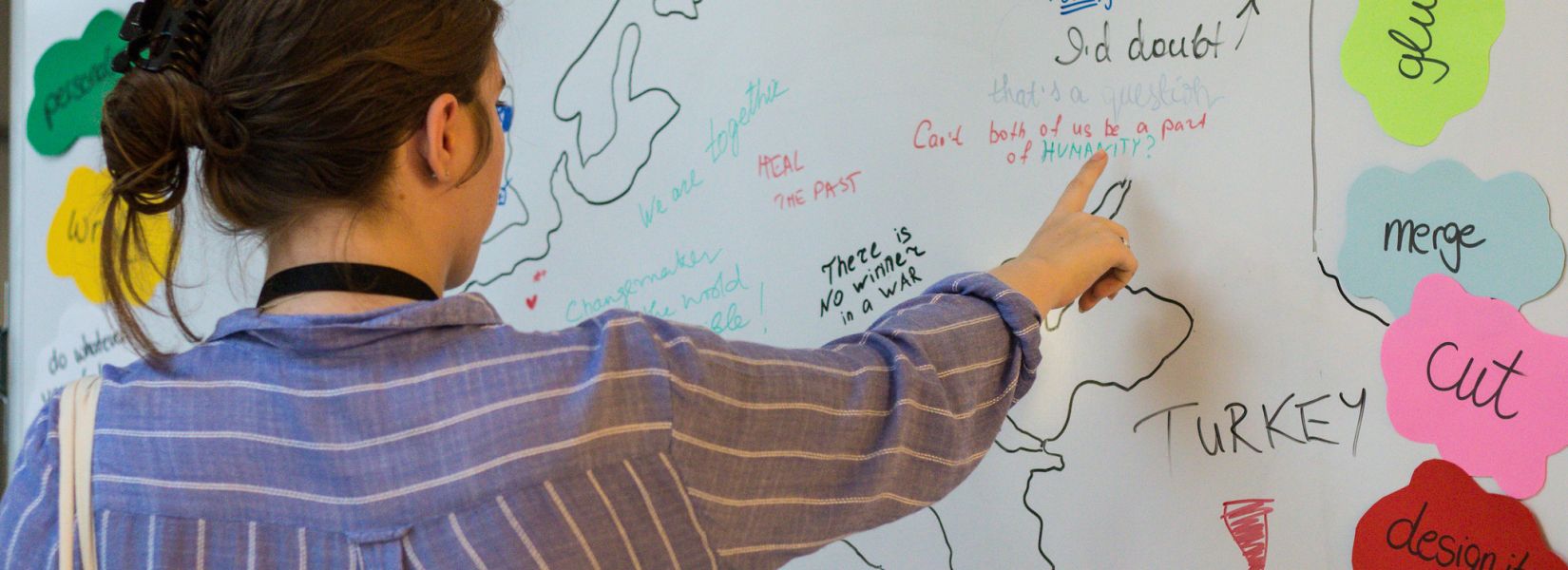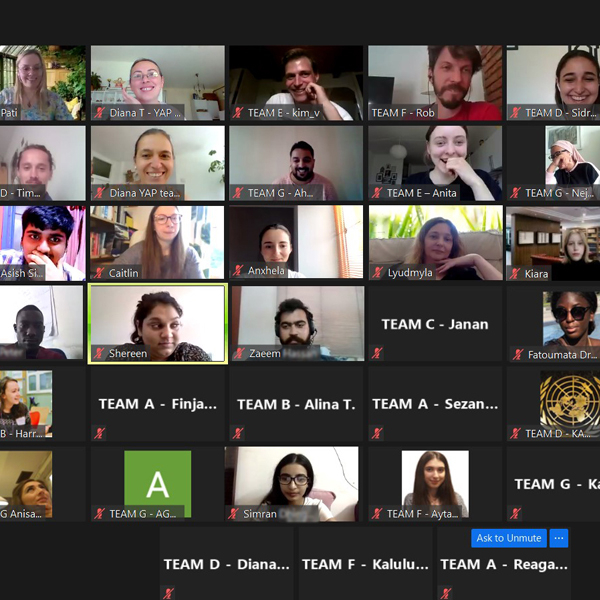Building networks for an inclusive Europe
Addressing Europe's Unfinished Business 2018
19/08/2018
A primary school teacher from Belarus sits at the lunch table with an ex neo-Nazi from Sweden, who now works to prevent extremism among youngsters. ‘What can we do as parents and teachers?’ she asks him. They engage in a conversation about ‘kitchen table racism’ and the difficult position of teachers. The next day, two floors higher in the building, a group of Kurds, Turks and Armenians from the diaspora discuss how to organize an international platform for dialogue. A woman involved in dialogue in Eastern Ukraine pitches in with her experience of engaging the broader public.
This is exactly the kind of exchange of knowledge, experience and tools that Addressing Europe’s Unfinished Business (AEUB) is aiming for. Over 180 participants from 32 countries have gathered in the Caux Palace in Switzerland from 23–27 July to equip and inspire themselves to develop social cohesion within their communities. They come from such fields as education, human rights, healthcare, media, business and politics. Although most are from Europe, all the other continents are represented too. Young people from the Learning to be a Peacemaker and Young Ambassadors Programme also take part.
The challenges to social cohesion in Europe are both numerous and diverse, from the rise of populist parties and the refugee crisis to downright war in Ukraine. And they extend through the whole spectrum: from broken families to polarized European institutions. Although the cultural and historical contexts may differ, the conference shows that much can be learned from each other. Through the four-day training tracks, personal storytelling, plenaries and informal meetings, key challenges to working for social cohesion are identified.
One is the need for self-assessment. Speakers illustrate how prejudice and sometimes even hatred can be passed down through families, educational systems and society. Unless we are aware of this and decide to change the discourse, the animosity will continue. ‘I felt superior and was manipulated to despise Roma people for no good reason,’ says Diana Damsa from Romania. Her Roma compatriot, Simona Toroṭcoi, tells how she was ashamed of her identity, because of everything she heard around her. A Dutch Turk talks about the ‘enemies’ he inherited from his ultra-nationalist parents.
Different training tracks address this need for self evaluation, working with tools which raise awareness around the construction of history, narratives and personal opinions. ‘I wanted to learn tools to work with refugees,’ says Laurence Herr, a manager from France. ‘I first learned to interrogate myself. I thought I didn’t have prejudices, but realized I often unconsciously act based upon biased ideas.’
There is a need for more critical thinking and we all need to improve our fact-checking skills, says keynote speaker Tatiana Peric, adviser on Combating Racism and Xenophobia for the Organization for Security and Cooperation in Europe. ‘Very often discriminatory practices are institutional and systemic, which makes them very difficult to address and to dismantle.’
Other issues are the importance of education, reconstructing history and being careful about the language we use. ‘Language has to be inclusive, otherwise we cannot connect,’ stresses British diplomat and politician Lord Ashdown. ‘How can we make sure we don’t fall prey to propaganda as journalists in the middle of a war?’ asks journalist Oleksiy Matsuka from Eastern Ukraine, founder of the Donetsk Institute of Information. ‘How do we keep presenting information without bias?’
Matsuka and six other journalists from Ukraine meet several times during the conference to discuss these questions. They struggle to maintain their professional independence in difficult circumstances and are dedicated to ethical journalism that contributes to unity in their country. They will continue to exchange experiences and support each other when they get home.
Other important conversations take place during AEUB. One afternoon, participants from Ukraine, Russia and Belarus sit together. They work in the field of education, human rights, politics and journalism. During the meeting the need for honest and secure dialogue is voiced. Some 20 young people with roots in Turkey and Armenia meet several times to discuss how they can overcome the animosity they have inherited from their parents. Participants have come from the Netherlands, Armenia and Lebanon for the latest in a series of annual dialogues in Caux. This year the group decides to take it to the next level and create an international platform to promote dialogue between Kurds, Turks and Armenians.
‘The paradigm structure of our time is the network,’ says Lord Ashdown. Networks can work for good or bad. This week in Caux contributes to the building and strengthening of networks of people who feel a personal responsibility for a sustainable and inclusive Europe.
The conference team wants to thank everybody for making this event a success and invites you to join next year’s conference, Tools for Changemakers 2019, Rebuilding Trust in Europe, from 9-14 August!
By Irene de Pous






























